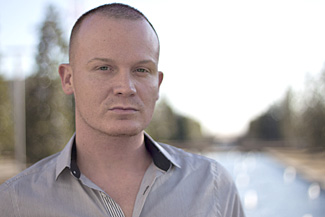James Tate readily admits that his journey from the Texas Panhandle, to the big city, to his role as a grassroots organizer seemed improbable when he began his first college semester 16 years ago.
Now a UT Dallas graduate student in public policy, Tate initiated a new program offered through Dallas County which educates the public about the functions of the District Attorney’s Office.

James Tate, UTD graduate student in public policy, gave shape to a new Dallas County program. (Photo by Chris Wang)
Tate, originally from Amarillo, wasn’t sure what he wanted to do after graduating from high school, and the vision wasn’t any clearer after attending a few months of college.
“I initially went to Texas State University, but I had no idea what I wanted to do with my life and I felt like I needed some other experiences,” he said. “As much as I knew it would disappoint my family, I had to quit and do something else.”
His path took him 1,100 miles west to Los Angeles, where he began a new career as a makeup artist.
Doors opened. He got to rub shoulders with some major players in the film industry at a young age.
“I would go to sleep at night thinking, ‘That was so amazing, but is this ultimately the legacy that I want to leave behind?’ I knew somewhere innately that I had so much more to offer the world.”
He said he didn’t know in what capacity he would be able to do that. But after several years of success in L.A., he felt the time was right to leave and explore academics again.
Tate landed in Dallas at the age of 28 ready for new challenges. He attended classes at a community college to prepare himself for the academic rigor of a four-year university, before starting classes at UT Dallas.
“I thought I’d start out in business, but Dr. Tony Champagne (at UT Dallas) changed all of that for me,” Tate said. “I took a law and medicine class with him and it really fired up my desire to pursue public policy.”
Tate changed his major, graduated magna cum laude and was part of the 2010 Bill Archer Fellowship cohort. He wanted to translate his academic success into something tangible, which led him to his initial contact with the Dallas County District Attorney’s Office.
“Dr. Champagne suggested that I go to a citizen’s academy in Collin County, which teaches the public about the functions of the district attorney’s office,” Tate said. “It includes information about prosecution and the judicial process.”
It was a good learning experience, but one that Tate couldn’t commit to initially. He wondered if other counties offered similar programs and discovered that Dallas County did not.
Tate made one cold call to the DA’s office and within a week found himself writing a proposal for a Dallas County Citizen Prosecutor Academy.
“I got to meet with the DA (Craig Watkins) and he wanted to start right away,” Tate said. “Dallas County is so diverse and this is a great way to open up a dialogue between the public and the prosecutor’s office.”
Dr. Richard Scotch, professor of sociology and public policy at UT Dallas, encouraged Tate to use some of his coursework in independent study to create the program.
“One of the goals of the public policy program is to help people hone their skills in policy analysis and policy advocacy,” Scotch said. “Creating this academy was all due to his initiative, and we were pleased to see one of our students help develop something so beneficial.”
The first Citizen Prosecutor Academy began earlier this year and a second round started Sept. 6 and will conclude with a formal graduate ceremony at the end of November.
Champagne, a professor of political science and director of the pre-law program in the School of Economic, Political and Policy Sciences, said Tate’s enthusiasm and actions reflect the exceptional strength of the school’s students.
“We encourage our students to take the kind of initiative James has taken,” Champagne said. “We are proud of his commitment to his own educational success and to improving his community.”
Tate said that after he finishes his graduate degree, he’s open to several possibilities including working for, or starting a non-profit organization aimed at LGBT issues. He currently serves as the chair of the Greater Dallas local chapter of the Gay, Lesbian and Straight Education Network. But more than anything else, he wants to inspire others to create positive changes in their communities.
“I hope I can inspire students who maybe have an idea but are reticent to talk about it,” Tate said. “There is a fear factor of rejection, and I want them to know that being told, ‘No’ is not the worst thing that can happen to you.”